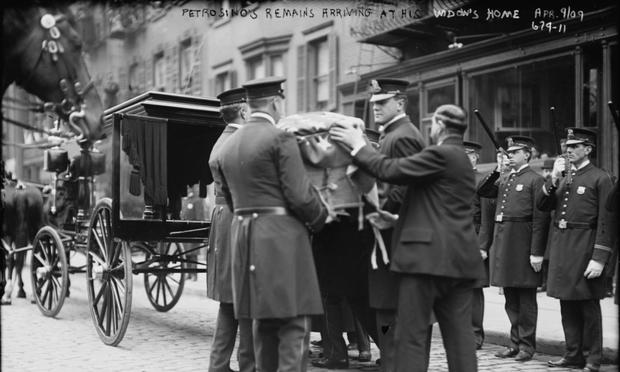NYPD Funerals: Intense Affairs with Flourishes from the Civil War
Friday, December 26, 2014
WNYC
Play
00:00 / 00:00
 Scene from the 1909 funeral of NYPD Lieutenant Petrosino, who was assassinated by the Sicilian Mafia. (Fonderia USA)
Scene from the 1909 funeral of NYPD Lieutenant Petrosino, who was assassinated by the Sicilian Mafia. (Fonderia USA)
Bagpipes, helicopters, folded flags.
Over time, these have become the solemn details at the funeral of a New York City police officer. Soon they'll be observed again, when services are held for Rafael Ramos and Wenjian Liu, the city's most recently slain officers.
Some of the traditions are relatively new, like the helicopters: they fly in a formation that leaves a gap of sky to symbolize lost members of the force. Others have their roots in the Civil War, according to Tom Reppetto, the author of several books on policing in New York.
More precisely, the traditions were carried over by soldiers returning from the war and entering the city's police department. "After the Civil War, a lot of police departments and other organizations began to adopt the uniforms, the rank structure," Reppetto said.
That's when New York's police department, at funerals, took up the military custom of removing an American flag from the casket of a fallen officer, folding it, and then presenting it to the family with words of thanks.
A Department With Civilian Roots
New York established its police force in 1845. City leaders modeled it directly on London's Metropolitan Police Service, which was designed to be a civilian organization, not an army. New York cops wear uniforms that are blue because London's cops wore blue — to distinguish them from Britain's military, which wore red coats.
Former police chief John DeCarlo, who's now a professor at John Jay College of Criminal Justice, described the somewhat conflicted nature of a civilian force that at times adopts a military culture. "I've been to police funerals where there's been a 21-gun salute," he said. "Cops aren't military but we function in a paramilitary environment."
The Current Tension
DeCarlo said that could add to the tension when Mayor de Blasio shows up for the funeral of Officer Ramos. Some cops blame de Blasio for what they see as anti-police sentiment in the city, based on his treatment of protestors objecting to NYPD tactics. An online message board popular with officers features calls for turning their back on the mayor — along with pleas to act respectfully in honor of the fallen men.
De Carlo said he hopes the funerals serve their primary function for the officers who attend, which is to grieve in solidarity with each other and their profession. "I've been to many of them and I've been sad but I felt part of a bigger picture," he said. "I didn't feel alone, I felt part of a shared worldview."
Kilts & Droning
That worldview now includes the idea that police funerals must have bagpipes.
The pipes became de rigueur in the 1960s, with the rise of the Emerald Society, nicknamed "the NYPD Irish brigade." But the days of a majority Irish rank-and-file are long gone, giving way to a much more diverse force that includes the two officers slain this past week: Officer Ramos' family is from Puerto Rico, and the parents of Officer Wenjian Liu were born in China. Lately, immigration has been remaking the NYPD as surely as it has been changing the mix of ingredients in New York's melting pot.
Still, De Carlo thinks the bagpipes will hang on as a tradition at police funerals. What other instrument could make a sound so mournful?

No comments:
Post a Comment
Please leave a comment-- or suggestions, particularly of topics and places you'd like to see covered